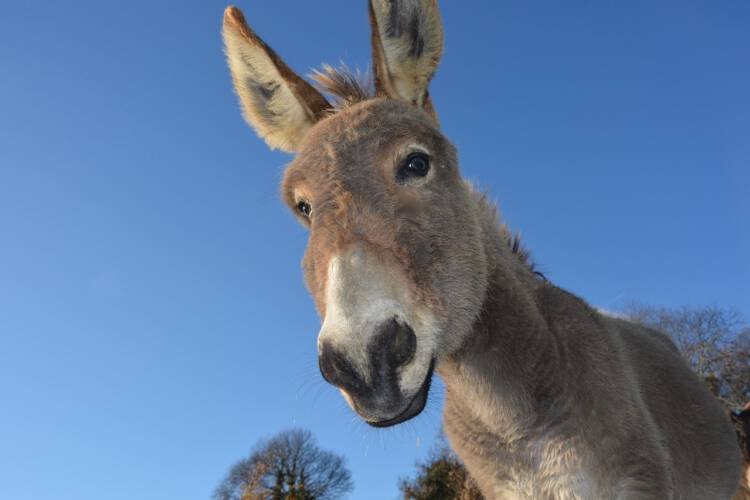Is donkey intelligence something that can be tested?
Measuring animal IQ scores has been a topic of interest to researchers for more than a century.
In 1883, for example, the journal Nature wrote about the intelligence of cats and chickens.
In recent years, researchers have studied the IQs of chimpanzees, dolphins, elephants, dogs, pigs, horses, raccoons, rodents, parrots, pigeons, lizards, snakes, turtles, fish, and spiders, to name just a few.
The latest animal to join this club is the Equus asinus.
Researchers in Spain and the United States have now come up with a test that measures donkey IQ.
Past glories: donkeys as elite animals
As the researchers explain in their recent paper, donkeys were once considered elite animals.
This was especially true in the Egypt of 5,000 years ago.
But their reputation has declined considerably since then.
Even the works of Homer and Aesop portray donkeys as stupid, stubborn, servile, and low-status.
This is especially true in contrast to horses, which were seen as exalted and beautiful.
Many languages also reflect this low status, with many derogatory words for donkey (like “asinine”).
Even the title of this current paper (“Dumb or smart asses?”) playfully refers to this lowly history.
And that matters, because the way we represent animals also influences our treatment of them.
Donkeys have been dutifully carrying our stuff for millennia, but get little respect in return.
Although about 40 million donkeys now live throughout the world, their importance as pack animals has dropped.
In fact, the Spanish government currently categorizes the Andalusian donkey as an endangered breed. That breed happens to be the one studied in the current research paper.
Donkey intelligence makes them popular therapy animals
It’s tragic for any animal to face extinction, but it’s especially unfortunate in this case.
Donkeys have been growing increasingly popular as “therapy animals,” especially for autistic children. The researchers refer to the donkeys’ “empathic nature,” which owes much to the way have evolved to interact with humans.
And that’s where the donkey IQ test comes in: learning more about donkey’s cognitive skills means that people can breed donkeys with the traits that make them maximally desirable as therapy animals.
Are donkeys smart? Assessing donkey intelligence
Are donkeys smart? Yes, they are.
In fact, the study’s authors came up with a list of 13 traits that can be used to measure just how smart an individual donkey is.
Those traits include things like memory, trainability, concentration, and curiosity.
The list was developed In consultation with donkey breeders, who certainly know a thing or two about donkey intelligence.
The team then devised a task — think of it as a “donkey IQ test” — that allowed them to rate about 300 donkeys on each of these 13 traits, on a scale of 1 to 5.
The task involved placing a cloth in front of the donkey and observing how it reacted, both with and without prompts. Depending on the situation, the donkey had to walk across the cloth, walk around it, stand on it, etc.
The researchers found significant positive correlations between almost all of the cognitive traits they measured, ranging from 0.12 (the correlation between alertness and dependence) to 0.81 (between memory and trainability).
So how smart are donkeys? Like with humans, some are smarter than others
And these correlations mean that something akin to a g factor, or general intelligence, also applies to donkeys.
The “low IQ” donkeys, for example, tended to share a cluster of traits that included being difficult to train, uncooperative, and less able to memorize an assigned task.
As the researchers put it, “Our results provide some of the first evidence that an analogous factor to human g may underpin cognitive performance in donkeys and account for a similar distribution in the human population.”
Their results also suggest that donkey intelligence follows the same Gaussian distribution found in human IQ.
Genetically, the heritabilities of these 13 traits ranged from 0.06 (for dependence) to 0.38 (for the ability of the donkeys to enter or leave their stables).
Breeding for desirable traits
This knowledge lets breeders select for donkeys that are more easily trainable, more willing to cooperate, easier to handle, and more likely to remember new tasks. In other words, an intelligent donkey is what both breeders and farmers prefer.
The researchers add that as they amass more data, they will probably discover more factors.
And these will have even higher heritabilities.
This research may also open a new path toward finding specific genes that lead to these desirable behavioral traits in other therapy animals, or even to a better understanding of the underlying biological mechanisms behind cognitive processes in humans.
Knowing more about donkey personality traits will also help.
In sum, the researchers write: “There are donkeys which are more intelligent than others, and the present methodology enables quantifying such differences.”
Study: “Dumb or smart asses? Donkey’s (Equus asinus) cognitive capabilities share the heritability and variation patterns of human’s (Homo sapiens) cognitive capabilities” (link)
Authors: Francisco Javier Navas González, Jordi Jordana Vida, José Manue León Jurado, Amy Katherine McLean, and Juan Vicente Delgado Bermejo
Published in: Journal of Veterinary Behavior, Volume 33, September-October 2019, Pages 63-74
Photo: by JacLou DL via Pixabay




